The Day of Pentecost is celebrated 50 days after Easter and marks when the Holy Spirit came to the apostles. You'll find this event is central to the birth of the Church, as the apostles received the power to speak in various languages, communicating Christ's message to diverse crowds. About 3,000 people were baptized that day, showcasing the Spirit's impact. This occasion also roots in the Jewish Feast of Weeks, closely tied to harvest and unity. Understanding Pentecost deepens your connection to its meaning and significance, inviting you to explore the ongoing role of the Holy Spirit in everyday life.
Key Takeaways
- The Day of Pentecost is celebrated 50 days after Easter, marking the descent of the Holy Spirit upon the apostles.
- It signifies the birth of the Church and the fulfillment of Christ's promise to send the Holy Spirit.
- Apostles experienced miraculous events, including speaking in various languages, enabling them to communicate the Gospel to diverse audiences.
- The day culminated in the baptism of about 3,000 individuals, showcasing the Holy Spirit's transformative power.
- Pentecost emphasizes communal unity and inclusivity, reflecting the early Church's dedication to fellowship and shared faith experiences.
Introduction
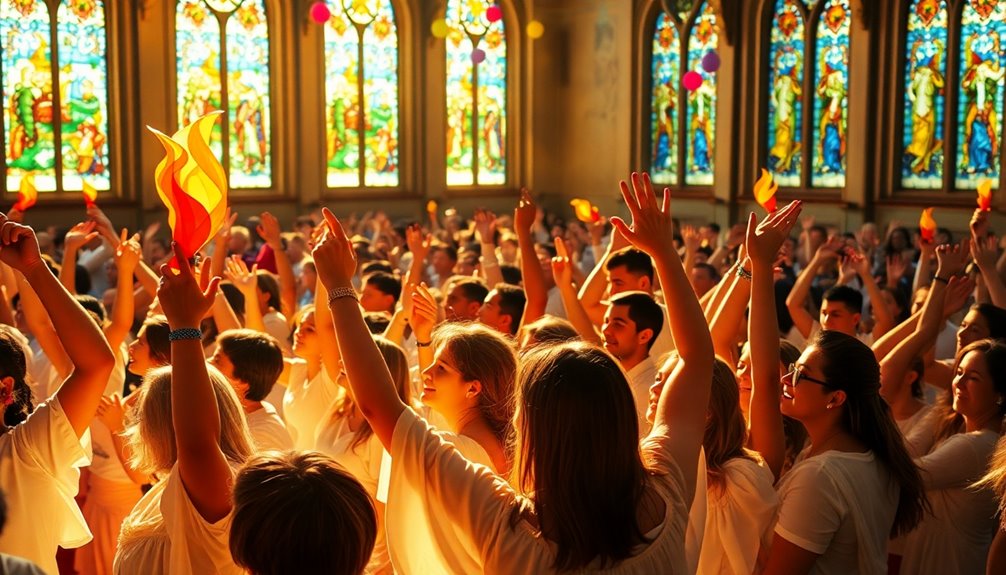
The Day of Pentecost is a pivotal moment in Christian history that you mightn't want to overlook. Celebrated 50 days after Easter, Pentecost marks the dramatic descent of the Holy Spirit upon the apostles, as detailed in Acts 2. This event is more than just a Christian celebration; it signifies the birth of the Church and the fulfillment of Christ's promise to send the Holy Spirit.
On this extraordinary day, the apostles experienced a mighty wind and saw tongues of fire, symbols of the powerful presence of the Holy Spirit. This divine intervention enabled them to speak in various languages, bridging cultural gaps and spreading the message of Christianity far and wide.
Pentecost is also connected to the Jewish festival of Shavuot, originally a harvest celebration, representing a significant shift from the Mosaic Law to the Holy Spirit's central role in Christian faith.
The day culminated in the baptism of around 3,000 people, highlighting the rapid growth of the early Church and the beginning of its global mission. In essence, Pentecost stands as a cornerstone event that continues to inspire and energize believers today.
Scriptural Significance of Pentecost
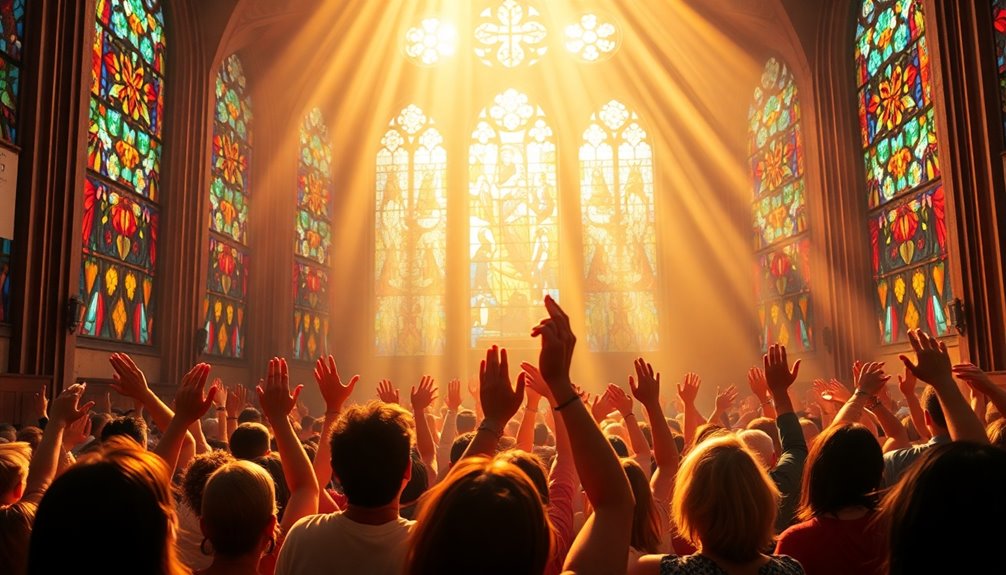
When you explore the scriptural significance of Pentecost, you'll find key references that illustrate its importance.
Acts 2:1-4 captures the moment the Holy Spirit empowered the apostles, while Peter's sermon connects it to the prophetic words of Joel.
These passages not only highlight the birth of the Church but also set the stage for its mission to share the Gospel with the world.
Primary Bible References
Pentecost serves as a pivotal moment in Christian history, primarily documented in Acts 2:1-4, where the apostles experience the dramatic descent of the Holy Spirit. This event is marked by a powerful wind and tongues of fire, symbolizing God's presence among them.
As you read further in Acts 2:5-11, you'll see the multilingual phenomenon unfold. The apostles begin speaking in tongues, allowing Jews from various nations to hear the message of Christ in their own languages.
Peter's sermon, found in Acts 2:14-36, connects the Pentecost event to the Old Testament prophecy of Joel 2:28-32, which foretells God pouring out His Spirit in the last days. This connection underscores the fulfillment of God's promises.
The impact of Peter's message is significant; Acts 2:37-41 reveals that about three thousand people are baptized that day, marking a remarkable growth of the early Church.
Finally, Acts 2:38-39 highlights the theological importance of the Holy Spirit in believers' lives, emphasizing that the promise of the Holy Spirit is available to all who believe. This underscores the lasting significance of Pentecost in the Christian faith.
Secondary Bible References
Highlighting its scriptural significance, Pentecost stands as a fulfillment of God's promise to pour out His Spirit on all people, as prophesied in Joel 2:28-32. This pivotal event, recorded in Acts 2:1-4, marks the arrival of the Holy Spirit, symbolized by a mighty wind and tongues of fire.
On this first Pentecost, the apostles received empowerment to spread the Gospel beyond cultural boundaries. Peter's sermon in Acts 2:14-36 connects the outpouring of the Holy Spirit with Jesus' resurrection, affirming the continuity of God's plan and enriching the Christian tradition.
The speaking in tongues during Pentecost (Acts 2:6-11) illustrates how the Holy Spirit enabled the apostles to communicate effectively with a diverse crowd, breaking down linguistic barriers and inviting all to embrace the message of Christ.
The impact of this day is further highlighted in Acts 2:41, where about 3,000 individuals are baptized, showcasing the transformative influence of the Holy Spirit's arrival. This moment not only marks the birth of the Church but also serves as a reminder of God's inclusive call to all people throughout history.
Jewish Harvest Festival Origins

The Feast of Weeks, known as Shavuot, serves as a vital Jewish harvest festival celebrated 50 days after Passover. This festival marks the end of the grain harvest and has deep-rooted significance in Jewish tradition. Shavuot commemorates the giving of the Torah at Mount Sinai, intertwining spiritual and agricultural themes.
During this time, you'd likely see families traveling to Jerusalem to present offerings of the first fruits of their harvest at the Temple. This act emphasizes the connection between agriculture and faith, reminding you that every blessing comes from God.
As one of the three pilgrimage festivals, along with Passover and Sukkot, Shavuot fosters a sense of community among Jews, uniting them in shared religious experience.
The rich traditions of Shavuot not only celebrate the bounty of the earth but also highlight the importance of divine revelation. This foundational festival set the stage for the Christian celebration of Pentecost, where themes of harvest and spiritual awakening continue to resonate.
Understanding Shavuot's origins gives you insight into the profound connection between faith, community, and cultivation of both the land and the spirit.
Spiritual Gifts Manifestation

During the Day of Pentecost, spiritual gifts manifested powerfully among the apostles, showcasing the Holy Spirit's dynamic presence. The apostles began speaking in tongues, allowing them to communicate the Gospel to a diverse audience gathered in Jerusalem. This remarkable event marked a pivotal moment in the New Testament, where the gifts of the Holy Spirit, including prophecy and healing, were evident as signs of God's active involvement in the early Church.
As believers were filled with the Holy Spirit, the mission of the Church began, empowering each member to fulfill their role in spreading Jesus Christ's message. The diversity of spiritual gifts reflects the unity and inclusivity of the Christian community, where everyone contributes uniquely to the body of Christ.
This event also fulfilled Joel's prophecy, affirming that God would pour out His Spirit on all people, resulting in a rich tapestry of spiritual gifts across various demographics.
The manifestations at Pentecost illustrate God's desire to equip His people. By embracing these gifts, you're not only participating in the Church's mission but also experiencing the transformative power of the Holy Spirit in your life.
Misunderstanding the Holy Spirit
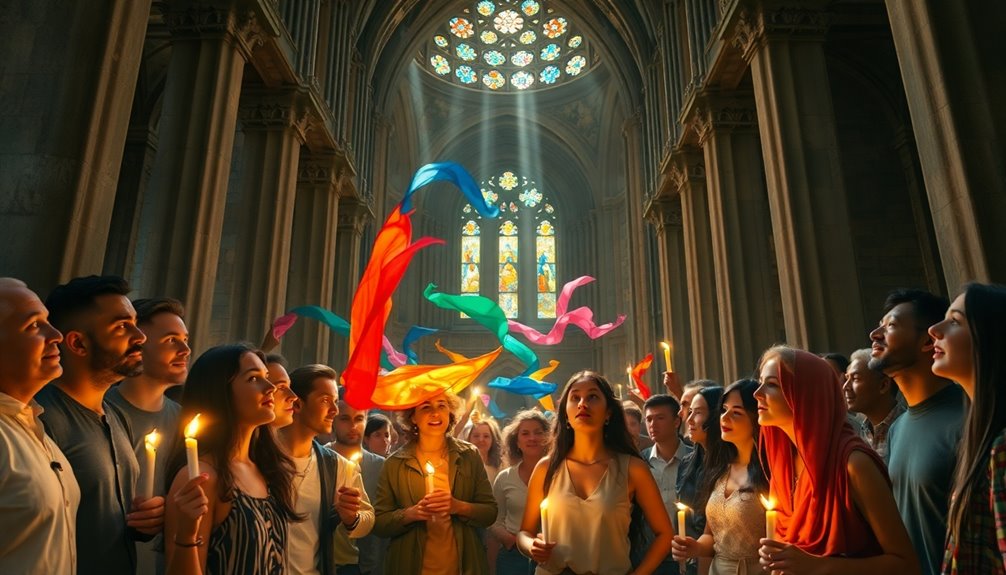
When you think about the Holy Spirit, it's easy to fall into common misconceptions that overshadow its true purpose.
Many people misinterpret spiritual gifts and focus solely on personal experiences, missing the broader mission of the Church.
It's crucial to clarify these misunderstandings to fully appreciate the transformative power of the Holy Spirit in our lives and communities.
Debunk Holy Spirit Misconceptions
While many people view the Holy Spirit as an abstract concept or an impersonal force, Scripture clearly reveals Him as a distinct person of the Trinity, actively engaged in the lives of believers.
At Pentecost, the Spirit manifested His presence, empowering disciples from every nation under heaven, demonstrating that His gifts aren't reserved for a select few. Instead, these gifts are available to all who believe, breaking down cultural and linguistic barriers.
Some mistakenly think the Holy Spirit only operates during specific events or services, but this overlooks His continual work in your daily life. The Spirit guides, encourages, and empowers you, providing wisdom and discernment as you navigate challenges.
It's essential to recognize that His role isn't limited to emotional experiences; He deepens your understanding of Scripture and helps apply it to your life.
Additionally, the belief that the Holy Spirit's work ended with the apostles contradicts biblical teachings. Acts 2:17 emphasizes the ongoing promise of the Spirit, indicating His continual involvement in the Church throughout history.
Embracing this truth allows you to experience the fullness of life in the Spirit every day.
Misinterpretation of Spiritual Gifts
Many people misinterpret spiritual gifts, viewing them as personal accolades rather than divine empowerments meant to serve the Church. This misinterpretation often leads to confusion about the role of the Holy Spirit in our lives. Spiritual gifts aren't status symbols; they're meant for the edification of the community. When you see gifts as personal achievements, you miss the essence of unity that the Holy Spirit fosters among believers.
The early Church thrived after Pentecost because members understood the necessity of using their gifts to promote inclusivity and community. For instance, speaking in tongues was intended to unify diverse cultures, not to showcase individual prowess. Moreover, the distinction between gifts, such as personal edification versus public proclamation, can create misunderstandings and discourage collaboration.
It's crucial to recognize that love must underpin the exercise of all spiritual gifts, as highlighted in 1 Corinthians 13. Without this foundation, the purpose of these gifts becomes distorted, and the community suffers.
In embracing the true nature of spiritual gifts, you contribute to a healthier, more unified Church that reflects the love and purpose of the Holy Spirit.
Everyday Faith Practices
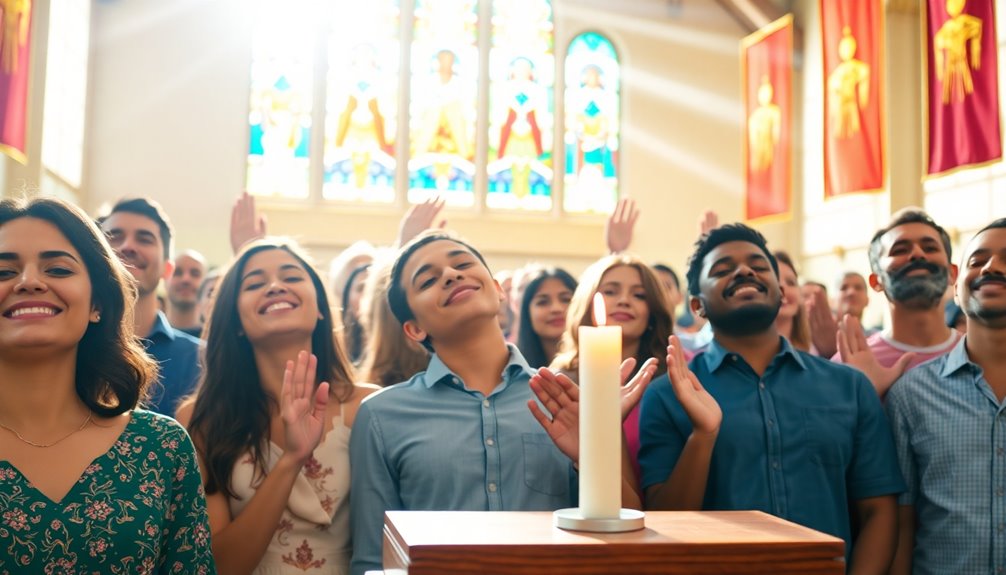
As you embrace the spirit of Pentecost, consider how daily prayer and reflection can strengthen your faith.
Engaging in congregational outreach initiatives not only enriches your community but also reflects the mission of the early Church.
Daily Prayer and Reflection
Daily prayer and reflection during Pentecost offers a powerful opportunity to connect with the gift of the Holy Spirit. By dedicating time each day, you can seek personal empowerment and guidance in your faith journey. Incorporating Scripture readings from Acts 2, especially the account of the Holy Spirit's descent, deepens your understanding of Pentecost's significance within the Church.
Engaging in communal prayer with fellow believers fosters unity and inclusivity, reflecting the diverse gathering of Jews from every nation during the original Pentecost. This shared experience not only strengthens your bond with others but also enhances your individual spiritual growth.
To further enrich your prayer life, consider using the liturgical color red in your personal or communal spaces. This color symbolizes the fire of the Holy Spirit and the transformative power of God's presence, reminding you of the divine empowerment available to you.
Reflecting on themes of empowerment, community, and mission during this season can inspire you to actively spread love and kindness in your everyday life. Embrace this time as an invitation to deepen your connection with God and your community through daily prayer and reflection.
Congregational Outreach Initiatives
Engaging with your community during Pentecost can amplify the spirit of inclusivity and outreach that this season embodies. As a church member, you have a unique opportunity to invite both existing congregants and those in your neighborhood to participate in meaningful events that celebrate the universal message of the Holy Spirit.
Consider organizing multilingual services or activities that honor the diverse backgrounds within your community. Just as the early church connected through language, your church can reflect this by fostering an environment where everyone feels welcome.
Outreach initiatives, like food drives or partnerships with local charities, can also emphasize the importance of meeting each other's needs, echoing Acts 2:44-47.
Think about hosting special events, such as "Pentecost parties," to promote fellowship and outreach. Share meals, enjoy music, and participate in activities that celebrate the birth of the Church.
Encourage your members to invite friends and neighbors, creating connections that extend beyond the church walls. By actively engaging in these outreach initiatives, you'll not only enrich your community but also embody the true spirit of Pentecost.
Significance of Communal Unity

While the Day of Pentecost is often celebrated for its miraculous events, the significance of communal unity shines through as a core element of the early Church. As described in Pentecost in Acts, this pivotal moment gathered Jews from every nation, breaking down cultural and linguistic barriers. The multilingual experience of the apostles speaking in tongues symbolized the Church's mission to reach diverse peoples, fostering a sense of belonging within the community of faith.
In Acts 2:42-47, we see the early church's dedication to communal unity. Believers shared their possessions, broke bread together, and devoted themselves to prayer, highlighting the importance of fellowship. This new paradigm established by the Holy Spirit emphasized love, mutual respect, and community, replacing division and isolation.
It aligns with Isaiah's prophecies about restoring God's people, where every individual finds a place.
The Day of Pentecost marks the beginning of a Church that serves as a bridge for individuals to connect with God. Rather than focusing on physical structures as sacred spaces, it underscores the power of communal unity and collective faith, inviting everyone into a supportive and inclusive community.
Additional Resources
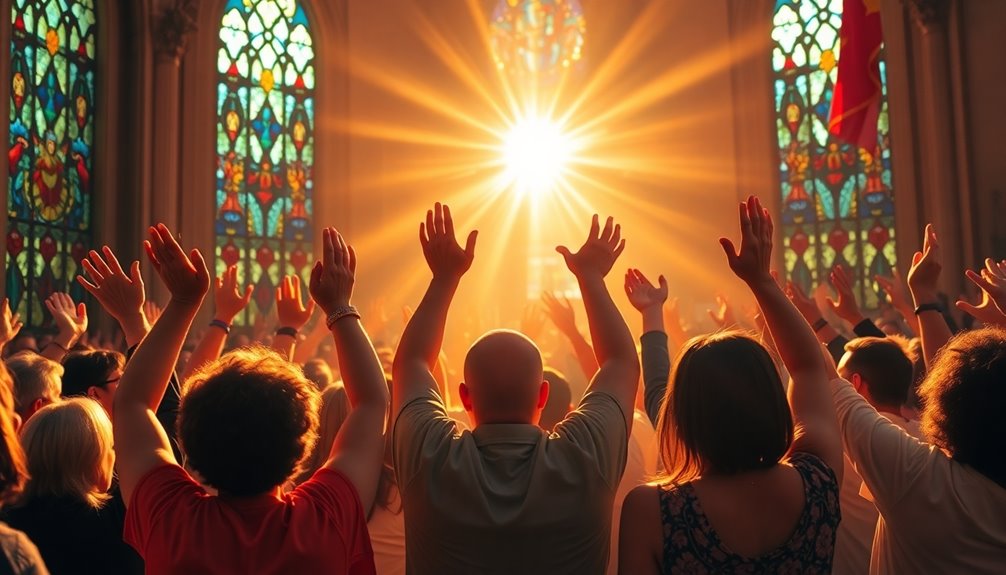
As you explore the significance of the Day of Pentecost, you'll find a wealth of additional resources to deepen your understanding. One excellent resource is the video titled "Pentecost: Acts 1-7," which vividly illustrates the events surrounding this pivotal moment.
You might also enjoy the podcast discussing "Pentecost and the Expected Unexpected Spirit," offering fresh insights into the transformative role of the Spirit during this Feast.
For deeper theological exploration, consider utilizing Temple Study Notes, which provide valuable context about Pentecost's significance and its implications for the early Church.
If you're interested in a comparative study of biblical texts related to Pentecost, BibleGateway.com is a fantastic tool. It offers access to 226 versions of the Bible in 71 different languages, making it easier to grasp the nuances of scripture.
Additionally, the community features on BibleGateway allow you to engage with others, sharing insights and discussing the theological implications of Pentecost.
Lastly, if you're part of the Episcopal tradition, you'll appreciate the specific liturgical practices and hymns outlined in Hymnal 1982, celebrating Pentecost as one of the seven principal Feasts.
Frequently Asked Questions
What Is the Meaning of the Day of Pentecost?
The meaning of this significant day revolves around the themes of renewal, empowerment, and community.
It symbolizes the transformation that occurs when you embrace the spiritual gifts within you. You're encouraged to reflect on how this day inspires you to connect with others, share your beliefs, and strengthen your faith.
It's a reminder that you can be a vessel for change, spreading hope and unity in your journey through life.
What Three Things Happened at Pentecost?
At Pentecost, three significant things happened.
First, you'd witness the Holy Spirit descending, accompanied by a powerful wind and flames.
Next, the apostles spoke in various languages, enabling diverse listeners to understand their message.
Finally, Peter delivered a stirring sermon that connected the event to prophecies, leading to about 3,000 people being baptized.
This pivotal moment highlighted the transformative power of faith and the birth of a vibrant Christian community.
What Does the Bible Say About the Day of Pentecost?
The Bible describes an extraordinary event where the Holy Spirit descends upon the apostles, empowering them to speak in various languages.
You'll see a diverse crowd in Jerusalem, amazed and hearing the message in their own tongues.
Peter delivers a compelling sermon, leading many to baptism.
This moment marks a significant transition in faith, illustrating how the Holy Spirit guides believers and establishes the foundation for the early Church's mission.
What Do Christians Do on Pentecost Day?
On Pentecost, you might participate in special worship services that include prayers, hymns, and scripture readings.
Your church may focus on the significance of the Holy Spirit and its impact on your faith journey.
You could also witness baptism services, symbolizing new life through the Spirit.
Joining festive meals and fellowship gatherings is common, helping strengthen your community ties.
You'll likely see red decorations, representing the fire of the Holy Spirit, adding to the celebration.










